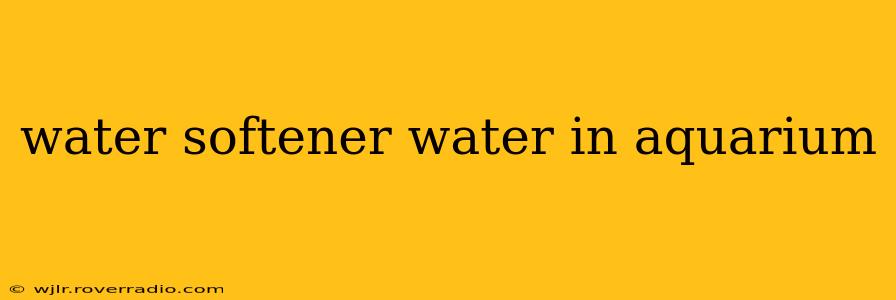Many homeowners use water softeners to improve the quality of their tap water, but can this softened water be used in an aquarium? The answer is complex and depends on several factors. This comprehensive guide will explore the pros, cons, and considerations of using softened water in your aquarium.
What Happens When You Soften Water?
Water softeners typically employ an ion-exchange process. Hard water contains minerals like calcium and magnesium, which cause scale buildup. The softener replaces these minerals with sodium ions. While this makes the water softer and better for appliances and plumbing, it introduces a high sodium concentration, which can be detrimental to many aquatic species.
Is Softened Water Safe for Aquarium Fish?
This is a crucial question, and the simple answer is: generally no, not directly from the softener. While some fish may tolerate slightly softer water, the high sodium levels and the removal of essential minerals are often harmful. Many aquatic plants and invertebrates are particularly sensitive to changes in water chemistry. The lack of calcium and magnesium can lead to skeletal problems in some fish and hinder plant growth.
What are the Risks of Using Softened Water in an Aquarium?
- High Sodium Levels: Excessive sodium can disrupt the osmotic balance in fish, leading to stress, illness, and even death.
- Mineral Deficiency: The removal of essential minerals like calcium and magnesium can negatively impact fish health and plant growth.
- pH Imbalance: Softened water can alter the pH level of your aquarium, potentially creating an unsuitable environment for your aquatic life.
How Can I Use Softened Water in My Aquarium Safely? (If At All)
Using softened water directly in an aquarium is generally not recommended. However, you can potentially use it in conjunction with other measures:
- Reverse Osmosis (RO) Water: Consider using RO water as your base water. This removes almost all minerals, including sodium. You can then add back essential minerals using a remineralization product specifically designed for aquariums. This method gives you greater control over the water's chemistry.
- Water Conditioner: Use a high-quality water conditioner designed to neutralize chlorine and chloramine and potentially buffer the pH, further mitigating the risks associated with softened water.
- Testing: Regularly monitor your water parameters (pH, GH, KH, and sodium levels) to ensure they remain within the acceptable range for your specific aquatic species. Make adjustments as needed.
- Partial Water Changes: Only use softened water for a very small portion of your water changes, always diluting it significantly with untreated, appropriately treated water. This approach is highly risky and generally not recommended.
What are the Alternatives to Using Softened Water?
The best approach is usually to avoid using softened water altogether. Here are better options:
- Spring Water: Spring water is often a good choice, offering a natural mineral balance. However, always check the mineral content to ensure it's appropriate for your aquarium inhabitants.
- Distilled Water: Distilled water lacks minerals, making it ideal for mixing with other water sources or for use with remineralization products.
- Tap Water (Treated): If your tap water isn't excessively hard, treat it using a high-quality water conditioner to remove chlorine and chloramine. You may still need to monitor water parameters closely.
Can I use softened water for rinsing aquarium equipment?
While it's generally not advised to use softened water directly in your aquarium, you can use it for rinsing equipment. Make sure to thoroughly rinse off any excess softened water before placing the equipment back in the aquarium.
Ultimately, the safest option is to avoid using softened water in your aquarium altogether. Using untreated or appropriately treated tap water, or spring water, combined with regular water testing and appropriate water conditioners, provides a much healthier and more stable environment for your fish and plants. Always prioritize the well-being of your aquatic life over convenience.
